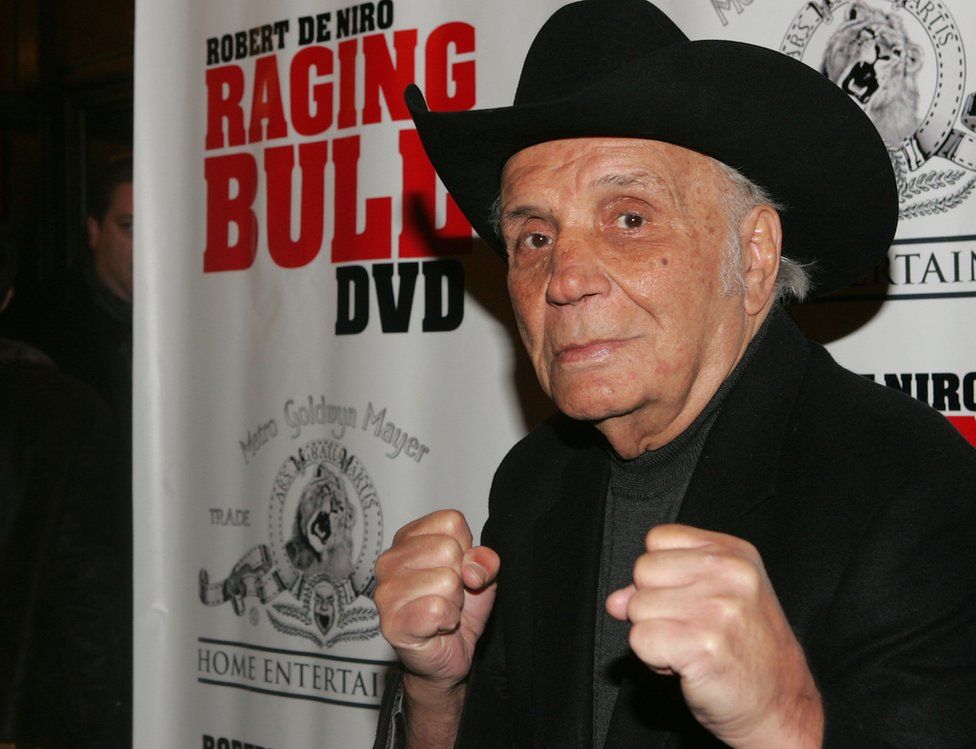Jake LaMotta: Legendary Raging Bull boxer dies at 95
- Published

Jake LaMotta, the uncompromising fighter portrayed by Robert De Niro in Raging Bull, has died aged 95.
The former world middleweight boxing champion died in a nursing home due to complications from pneumonia, his wife told US news site TMZ.
Based on LaMotta's 1970 memoir, Raging Bull depicts an emotional fighter struggling with life outside the ring.
The 1980 film, directed by Martin Scorsese, earned De Niro a Best Actor award at the Oscars.
"I just want people to know, he was a great, sweet, sensitive, strong, compelling man with a great sense of humour, with eyes that danced," Mrs LaMotta said.
Born on 10 July 1922 to Italian parents in the Bronx area of New York City, he took up boxing after being rejected by the US military due to a medical condition.
Sports commentators praised his willingness to take a severe beating in order to get close enough to land the best punches on his opponent.
His stamina in the ring, which he honed during a prison sentence, earned him the nickname "The Bronx Bull".
One writer for the Associated Press described how he fought with "blows bouncing off him like ball bearings off a battleship".
Allow Twitter content?
This article contains content provided by Twitter. We ask for your permission before anything is loaded, as they may be using cookies and other technologies. You may want to read Twitter’s cookie policy, external and privacy policy, external before accepting. To view this content choose ‘accept and continue’.
LaMotta first won national recognition two years after landing on the professional boxing circuit, when he handed Sugar Ray Robinson his first ever defeat in 1943.
His rough style, and strong chin, made him one of the most famous fighters in boxing during the 1940s and 1950s at a time when boxing was one of the nation's most popular sports.
After resisting Mafia efforts to control him, he later admitted to intentionally losing a fight at the behest of mobsters in 1947, causing him to suffer a suspension from the sport.
According to the International Boxing Hall of Fame, his career record was 83 wins, 19 losses, 4 draws, and 30 knockouts.
After retiring from the ring in 1954, he went on to act in several films, also touring as a stand-up comedian.
"The truth of the matter?" he told the Chicago Sun-Times in 1996. "The punches never hurt me.
"My nose was broken six times, my hands six times, a few fractured ribs. Fifty stitches over my eyes. But the only place I got hurt was out of the ring."
In the lead up to the filming for Raging Bull, LaMotta spent nearly a year personally training De Niro to box in a New York City gym, according to ESPN.
The film's stark style may have originated in LaMotta's own autobiography, in which he wrote: "Sometimes, at night, when I think back, I feel like I'm looking at an old black-and-white movie of myself.
"Not a good movie, either, jerky, with gaps in it, a string of poorly lit sequences, some of them with no beginning and some with no end. No musical score..."
After the film debuted, he expressed puzzlement as to why he had allowed his life to be depicted, and even worked on set as a consultant.
"When I saw the film I was upset. I kind of look bad in it," he told a reviewer.
"Then I realised it was true. That's the way it was... It's not the way I am now, but the way I was then."
- Published11 June 2015
- Published7 June 2006
- Published12 October 2012